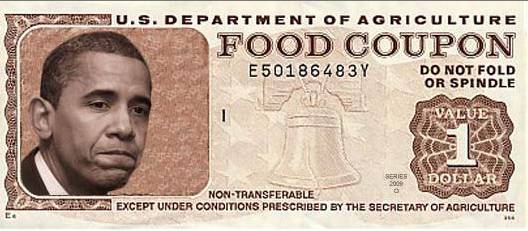
In a first, working-age people now make up the majority in U.S. households that rely on food stamps — a switch from a few years ago, when children and the elderly were the main recipients.
Some of the change is due to demographics, such as the trend toward having fewer children. But a slow economic recovery with high unemployment, stagnant wages and an increasing gulf between low-wage and high-skill jobs also plays a big role. It suggests that government spending on the $80 billion-a-year food stamp program — twice what it cost five years ago — may not subside significantly anytime soon.
Food stamp participation since 1980 has grown the fastest among workers with some college training, a sign that the safety net has stretched further to cover America’s former middle class. (Source: Associated Press and FoxNews.com)
The presidential election of 2012 changed everything. For the first time possibly ever, the state of the economy (in the absence of a war) did not matter in the outcome of the election. Obama’s economic policies had obviously failed — and a majority agreed, based upon numerous polls or the plain evidence available. Yet he won reelection anyway, easily.
Reason would tell us that food stamps spreading to the middle class is an indication of economic failure. Imagine if this took place during the two-term administration of a Republican president. The howls of outrage would be deafening.
But it’s not news under a hard-core, left-wing, essentially socialist administration. Why?
The issue is morality. A majority of Americans now believe that the purpose of government is not to protect — but to take care of them. If you asked a reliable sample of Americans if they believe in socialism, most would probably still say no. But they have agreed to the underlying attitude that makes socialism both possible and inevitable: “Government’s job is to take care of everyone.”
Once you go down this path, there’s no stopping it. People who agree with Obama’s mega-welfare state policies are quick to snap, “What’s wrong with you? Don’t you agree with helping the poor?”
This question takes two things for granted. One, that everyone getting the government assistance is poor. That’s obviously not true. Food stamps are now for the middle class, not just the poor or elderly on limited or fixed incomes. Two, it assumes that coercion is justified. It’s entirely possible to be in favor of voluntary charity while against government-coerced charity, on principle. You don’t have to agree with this position, but you cannot deny the distinction. No matter. Those who support Obama are generally advocates (and sometimes members of) the most elite centers of academia. You’d think they’d be smart enough to recognize this distinction, and they certainly are. What they lack is intellectual honesty.
The American government was founded to protect individuals: Their right to pursue happiness, their right to life, their right to their material possessions. The implicit morality here is that everyone is responsible for him- or herself, and while there is always a right to help anyone you wish, there is never an obligation to be imposed by law.
We have come full circle — in a complete moral and political U-turn — to have achieved a state where food stamps are now the norm, a benefit for the middle class and not primarily or exclusively for the poor.
Speaking for myself, the government has no right to redistribute one penny of wealth. It’s wrong in principle to seize the earnings of one to give to another, regardless of economic position. Back when the welfare state took off, first in the 1930s and then through expansion in the 1960s, there were those with my position who said, “Just helping the poor is a slippery slope. Eventually it will lead to everyone.” Such critics were either ignored or dismissed as crackpots.
Yet that’s exactly where we have arrived today. We were heading there before Obama, and due to Republicans almost as much as Democrats. But Obama, the unyielding and uncompromising advocate of the entitlement transfer-of-wealth state, made sure that we got there sooner.
And where are the Republicans? Does anyone expect these caricatures running their half of Congress to speak out against this? Will Republican Speaker of the House (for now) John Boehner shed a single public tear for what America has become? Not in a Washington DC minute.
Where do we go from here? The economy is not appreciably growing, wages are stagnant and businesses have learned to go without necessary employees; and most people don’t seem to care. They think it will all work out somehow, in the end, just so the government keeps providing for them. “How will I make a living?” is no longer the dominant concern in our society. “Who will take care of me?” is. That’s why the economic condition of the nation does not matter in the elections — even if the Republican Party could be counted on to alter it.
Economically, as well as psychologically and morally, this is a recipe for poverty. By preying upon the weakness and fear that governs the psyches of too many people, government increasingly steps in to “take care” of people rather than doing what it should be doing: Protecting the right of people to pursue happiness on their own, and keep the products of what they earn.
By their own standards, the self-righteous apostles of dependence in our government have been successful — at destroying the best within us: the quest for productivity, achievement and self-responsibility. Hope and change, indeed.
Be sure to “friend” Dr. Hurd on Facebook. Search under “Michael Hurd” (Rehoboth Beach DE). Get up-to-the-minute postings, recommended articles and links, and engage in back-and-forth discussion with Dr. Hurd on topics of interest.
